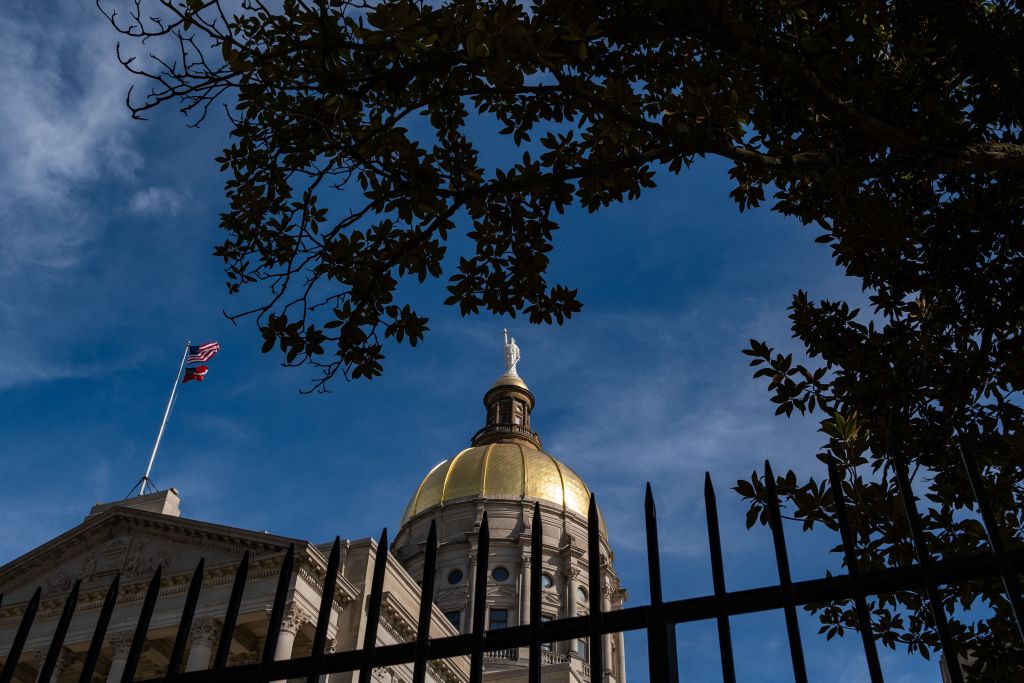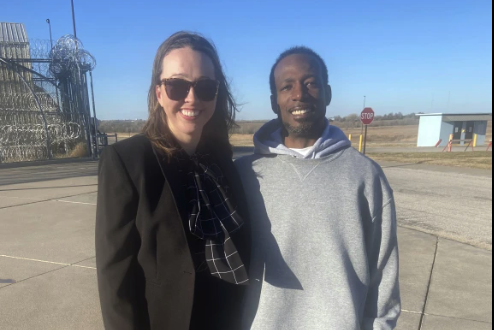Op-Ed: Georgia Cash Bail Bill Won't Make Communities Safer
Op-Ed: Georgia’s Cash Bail Bill Criminalizing The Poor Will Not Make Our Communities Safer

The Georgia State Capitol building in Atlanta. | Source: SETH HERALD / Getty
Last year, the American Civil Liberties Union of Georgia (ACLU-GA.) issued a report on overcrowding in the Fulton County jail. We found that on Oct. 26, 2023, nearly 400 people were in jail simply because they did not have the money to pay bail. This is the story across Georgia: People charged with minor offenses and who may even be wrongfully accused are jailed awaiting trial because they have no money. Or, when they do have money, it is needed for food, rent or other bills for their families. This practice does not make communities safer.
Last week, the Georgia Senate took a big step backward against yearslong criminal justice reform efforts in the state with the passage of Senate Bill 63 (SB 63), which expands the requirement for cash bail to more low-level offenses including criminal trespass, failure to appear for traffic citations and even possessing more than an ounce of marijuana, which is legal in nearly half of the United States. The greatest racial disparities are found in these lower-level offenses. For example, 90% of the people arrested for simple possession of marijuana in Atlanta were Black, before the ACLU and other advocates got the penalty changed to a ticketed offense.
MORE: How The Cash Bail System Can Literally Kill You
On Tuesday, the bill goes before the Georgia House. If it passes there, it will then go to the governor to sign into law.
The ACLU-GA. opposes this cruel bill, recognizing it will impact the most vulnerable communities, especially poorer Georgians, Black people and other people of color who do not always have money to post cash bail. While people with money get released to go home to their families and jobs, lower-income people sit in jail for the same offenses. Instead of returning to their communities, these people being held are forced to decide between pleading guilty (even if they are innocent) and waiting months or years for their day in court. We know that individuals who are held because they cannot afford a bond plead guilty 25% more than those who can afford to bail out and receive harsher punishments when they do. In Georgia’s jails, 51% of the population is Black, while just 30% of the state’s overall population is Black, according to a study by the Vera Institute.
A troubling aspect of SB 63 is a provision that bars individuals, churches, nonprofit community groups and others in any jurisdiction from bonding out more than three people per year. State Sen. Kim Jackson, who is also an Episcopal priest of a church that serves homeless people in Atlanta, said that “this bill will limit our ability to help parishioners who experience homelessness and suffer with mental health issues. They are often arrested on trespassing charges while trying to survive outdoors without basic needs.”
The ACLU’s Campaign for Smart Justice asserts that many bail practices are unconstitutional because they violate people’s rights to due process and equal protection under the Fourteenth Amendment, the prohibition against excessive bail found in the Eighth Amendment and the right to a speedy trial guaranteed by the Sixth Amendment.
If this bill becomes law, it will add to Georgia’s extremely high incarceration rate. Georgia “locks up a higher percentage of its people than any democratic country on earth,” according to the Prison Policy Initiative. Each year at least 236,000 people are booked into Georgia’s local jails. A humanitarian crisis at the Fulton County Jail, where 10 people have died in the past year, has brought an investigation by the Department of Justice. While proponents of this bill deny that overcrowding is an issue at the Fulton jail, we know that overcrowding has only recently gone down because of work to identify and release those who were being held because they could not afford bail. SB 63 removes the only relief available for many people trapped in Georgia’s jails. We are very concerned for how much worse conditions at the Fulton jail will be if SB 63 is allowed to become law.
The ACLU-GA.’s opposition to this bill continues a seven-year push for criminal justice reform that is largely focused on reducing jail populations. It is unjust that some people are punished based on an arrest – not a conviction – and must sit in jail for months or years often in inhumane conditions because they cannot afford to pay cash bail before their court date.
The ACLU-GA. encourages you to join us in opposing this bill that turns back the state’s progress on cash bail reform by telling state lawmakers to vote no on Senate Bill 63. Contact your legislator here.
Fallon McClure is the Deputy Director for Policy & Advocacy at the ACLU of Georgia. She leads its policy and advocacy work in the First Amendment, privacy and criminal justice spaces.
SEE ALSO:
California Supreme Court Rules Cash Bail ‘Unconstitutional’ For Defendants Who Can’t Afford It
Illinois Commits To Criminal Justice Reform, Becomes First State To End Cash Bail
















